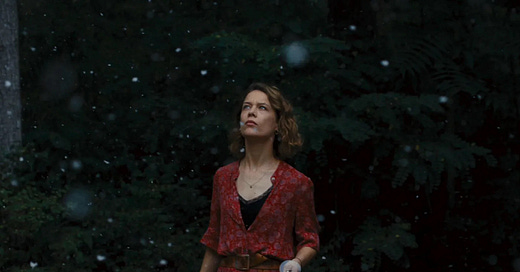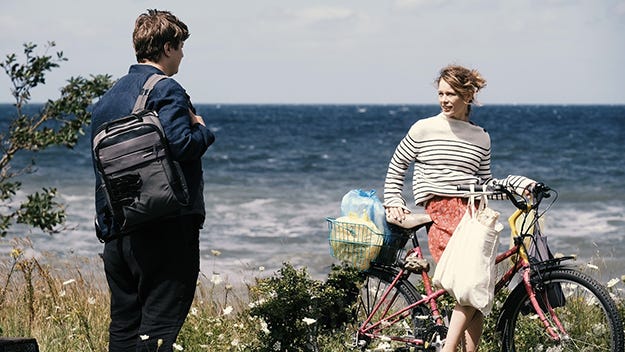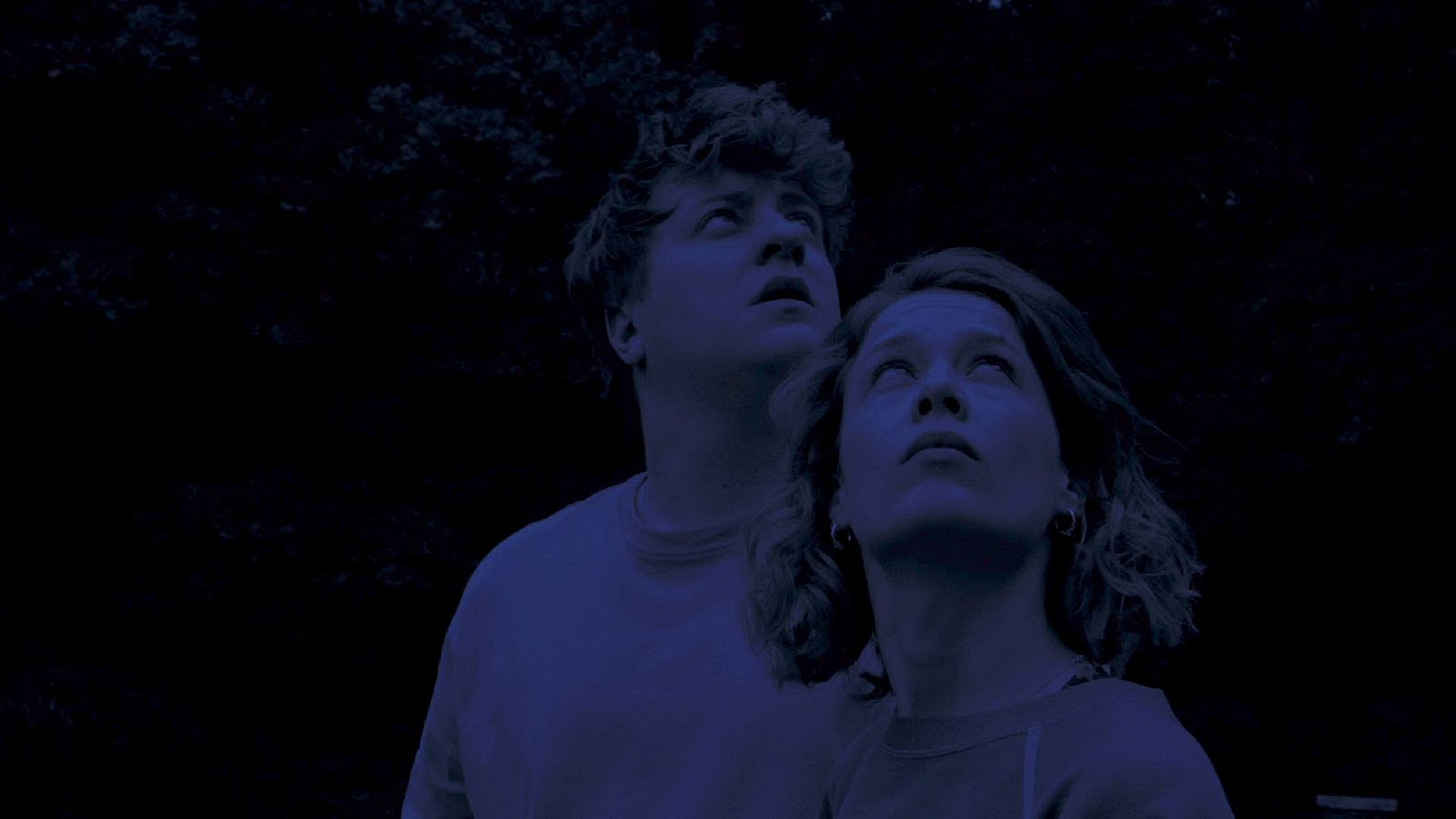Afire (2023)
Leon is afraid. Christian Petzold’s latest movie, Afire, opens like an 80s horror film: two young people drive down a heavily wooded road and one of them intones: “Something is not right.” Predictably, they soon find themselves hauling their belongings down a sketchy forest shortcut. Leon (Thomas Schubert) fights off panic as Felix (Langston Uibel) ventures ahead to confirm they haven’t made a wrong turn. Luckily, Leon isn’t a hot teen in a slasher film waiting to be slaughtered. He’s a serious writer, an adult, and he’s come to these woods to work.
Petzold is one of my favorite directors, balancing cinematic style, emotionally rich romance, and carefully considered moral/political themes across a variety of tones and genres. He is a magician of endings – his final acts are always surprising and precisely constructed, no matter what genre he’s working in. In Afire, he delivers one of the most satisfying movie endings I can remember, deliberately allowing us to paddle around in Leon’s shallow world view until the very end when both Leon and the audience are suddenly thrown into the deep end.
But back to the beginning. When the two friends eventually make it to Felix’s mother’s vacation home, another wrinkle presents itself: Felix’s mother has also invited Nadja (Paula Beer) to stay for the summer. Nadja’s dirty dishes and lacy underwear are strewn carelessly throughout the cottage, the detritus of the kind of indulgent summer holiday Leon has no interest in. She haunts him for days before they actually meet: dirty dishes spread out over every available work surface, loud sex in the next room keeping him up at night. As time passes and Leon finds himself unable to work, he’s increasingly gripped by the insecure panic we first glimpsed in the woods.
Afire (2023)
When Leon finally meets Nadja, she stands at the kitchen window and he looks into the house from the outside, maintaining a safe distance between himself and any connection that might distract him from his higher artistic purpose. Petzold said in a recent interview: “In all positions of the camera, you have a window and some view of the outside. But the wind moves through this picture. Everything’s open, but he’s closed, and in that he’s like poison, infecting the world with his negative attitude.”
Thomas Schubert’s performance as Leon is one of the funniest and most heartbreaking of the last year, relentlessly caustic and courageously pathetic, Lord Byron by way of Duncan Wedderburn. He knows that his judgemental frowns and loud sighs alienate him from others, but he’s so caught up in his own tortured melodrama that he just can’t help himself. It might be tempting to gender Leon’s grumpiness as mere toxic masculinity, but Petzold is reaching for something deeper – a startlingly self-reflective truth about the selfishness and insecurity that can isolate artists from the world, echoing Paul Thomas Anderson’s self aware exploration of the artistic temper tantrums in Phantom Thread that I wrote about earlier this month. Leon uses his “work” as a shield to stave off real connection and vulnerability. Better to have a one-sided relationship between genius writer and (presumably) adoring reader than to engage with a flesh and blood equal who has the ability to shame or distract you.
Leon is ultimately consumed by all the wrong fears: fear of fleeting brilliance, of being outshined or outfoxed, of people believing you when you tell them that you’re happier on your own, of letting yourself nap in the sun when you should be toiling away inside. Petzold referred to “summer movies” like La Collectionneuse and People on Sunday when writing the film: “In France, they call it education sentimentale. This is something that when you become an adult, you remember as a scar, as something that hurt you, or showed you something of the world.” Afire is ultimately a belated coming-of-age story that wrenches Leon open, exposing the selfish artist to the risks and pleasures of loving someone other than yourself.
Afire (2023)
An early feint at making Nadja a mere object of desire is cleverly subverted, and Petzold proves once again that he is committed to writing brilliant, richly drawn female characters. His habit of forming lasting collaborations with his lead actresses (first Nina Hoss, now Paula Beer) speaks to a desire to fully understand a single performer’s rhythms and capabilities, and it’s thrilling to see him turn over yet another side of Beer’s talents. As Petzold says of Nadja, ““We have to prove ourselves to her, but she does not have to do the same for us. This is something modern that Leon, with his 19th-century notions of seduction, projection, and so on, cannot understand.”
While Nadja and Leon’s companion Felix become friends, Leon self-consciously distances himself from the others, refusing invitations to the beach so that he can stay at the house and work on his novel, which seems to entail more napping than actual writing. Infuriatingly, everyone else seems to be managing to get their creative work done without sacrificing their social lives, and no one seems very interested in bearing witness to Leon’s performative Protestant work ethic. Meanwhile, Leon seems to actively resent finding himself in the middle of an Éric Rohmer movie, resisting the natural flow of any scene that threatens to lull him into leisure or contentment. Per Petzold: “He believes he is an artist and subject, though he is only playing an artist. When we created the [pergola,] his place where he works, we made it resemble a stage because he’s acting with his computer and reflective posing.” Nadja is the only person who can see past his posturing, and Leon seems relieved when she finally laughs at him for the fool he is and gives him something useful to do.
Afire (2023)
In the background of this casual comedy of manners, something deeper is amiss. On a trip to a nearby beach town for groceries, an ambulance drives past warning tourists that barbecues and bonfires are forbidden because of encroaching wildfires. Idyllic scenes ripped out of a Luca Guadagnino movie are punctuated by the roar of fire helicopters flying past. But as the wildfires rage closer and closer to their summer idyll, Leon sticks his head in the sand and hunkers down, clinging to his story’s place at the center of the universe.
With its ominous backdrop, Afire is a botched love story that could only take place in the disastrous present. A Rohmer-coded summer romance isn’t possible for most of my generation, whether for financial or environmental reasons. Petzold says: “I always had the feeling, from the summer movies of the French and American cinema I love, that we have thousands of summers left, and that thousands more generations can find their identities in the summer…[but] there are not so many summers left.”
The fleeting summers we do have left are a rare moment when the relationship between the body and the landscape becomes more important than the relationship between the body and the buildings in which we work and learn. But we are losing so many of the sentimental summer landscapes that used to provide refuge from the demands of productivity: the dunes of my hometown are inaccessible for most of the year because of Lyme-riddled ticks; the hills near my grandmother’s house where I spent most of my teen summers are now at constant risk of wildfires.
In an essay that Petzold references in the film, Werner Hamacher writes of the catastrophic Lisbon Earthquake of 1755, “Under the impression exerted by the Lisbon earthquake, which touched the European mind in one [of] its more sensitive epochs, the metaphor of ground and tremor completely lost their apparent innocence; they were no longer merely figures of speech.” In Afire, the summer forest is transformed into kindling full of dreadful potential. The woods that once played host to an idyllic summer “education sentimentale” threaten to transform from sanctuary to ash in an instant. As our characters fall in and out of love with one another, smoke creeps towards them, each tendril promising catastrophe.
Afire (2023)
With a burning future on the horizon and a complex web of inequities forced between us, how can love in the modern age resist being overwhelmed by disaster? Afire is part of a wave of films from the past year that depict romance as a necessary act of resistance that must persevere against insistent reminders of our social fragility. In Aki Kaurismäki’s Fallen Leaves, working class lovers take faltering steps towards one another while dispatches from a not-so-distant war intrude on the few private moments they’re able to steal. Origin, Ava DuVernay’s ambitious and deeply felt new feature, places a love story at the center of a woman’s personal and intellectual quest to identify the systems of oppression and hierarchy underlying human society.
In Afire, as in most great romantic tragedies, love comes too late. Some reviews of Afire claim that the film doesn’t have much of a narrative structure, but Petzold deftly hides the seeds of a devastating third act under the languid surface of his character study. As the film comes to an end, Petzold weaves together every loose end into a tidy knot, so securely fastened that the story takes on the fated quality of a fairy tale.
By the time the film reveals its tragic, slyly postmodern structure, it is too late for the audience as well: the story has already happened, we’ve already fallen in love with these characters, and there’s nothing we can do to distance or protect ourselves. But in Petzold’s hands, life always offers new opportunities to open ourselves up to the world. Petzold has criticized the proliferation of dystopian narratives in film and video games as capitalist fatalism. Though Afire is in some ways a disaster movie, Petzold carefully protects an optimistic, romantic worldview at the center of his capitalist dystopia. Hope feels like the wrong word, but Petzold offers a glimmer of understanding, of reckoning and romance, to anchor us beneath the pressures of a violent, calamitous world.
The film left me with the same feeling as the last pages of Sally Rooney’s Conversations with Friends, in which her protagonist, Frances, has a euphoric, disorienting moment of comprehending her place in the world – the vectors of late capitalism as a brush with the sublime:
“I closed my eyes. Things and people moved around me, taking positions in obscure hierarchies, participating in systems I didn’t know about and never world. A complex network of objects and concepts. You live through certain things before you understand them.”
Afire (2023)
I saw Afire in the middle of a thematically appropriate New York heatwave, buzzing with the insecurities and petty grievances that always seem amplified in the summer heat. I struggled to settle myself in the darkening theater, anxious that I had missed a deadline in order to trek uptown to see the film. But, like Nadja, Petzold’s film took me gently in hand and renewed my sense of greater human & creative purpose.
I left the theater dazzled and dehydrated and smelling — somehow — of smoke.
—
Afire is available to stream on Criterion Channel.
–
Next week I’ll be launching my monthly LA screening list for paid subscribers! A mix of upcoming exciting screenings in LA & quick thoughts on movies I’ve seen and loved in the past month.
-
NEVER CURSED VOL 2 INTERVIEWS & INSPIRATION
Petzold’s thoughtful interview on Afire with Isaac Feldberg
Petzold’s very funny Lincoln Center Q&A
Anton Chekhov’s short story “The House With The Mezzanine” that provided early inspiration for the film
The 1930 classic People On Sunday that Petzold referred to when making Afire
The creepy banger “In My Mind” by Wallners that Petzold uses as a motif throughout the film
–
NEVER CURSED WATCHLIST: LOVERS AGAINST THE WORLD EDITION











God I love Petzold. "courageously pathetic" is a great description of Leon. One of the great oafs of cinema.